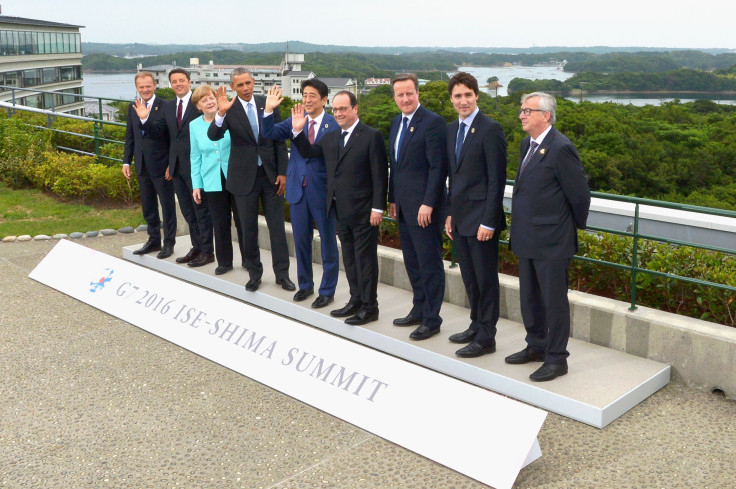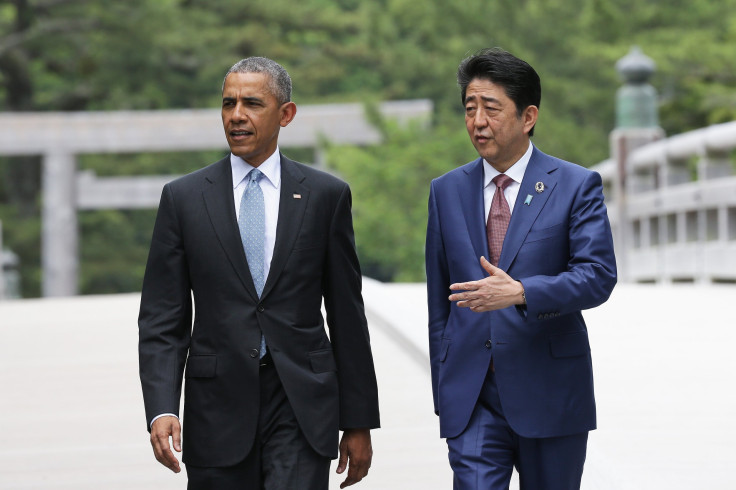G-7 Summit 2016: Leaders Warn Of Growing Economic Risks, But Outlook At Home Is More Mixed

Leaders of the Group of Seven advanced economies said Thursday they are worried growing economic risks — from low oil prices to sluggish Chinese demand — could continue to drag down the global economy for years to come. But officials gathered at the two-day summit in Japan are facing more promising prospects at home as consumer demand strengthens and markets improve in some of the countries.
The annual G-7 summit brings together Japan, the United States, Britain, Canada, France, Germany and Italy, along with the European Union’s council president.
While leaders voiced concerns emerging economies are in a severe situation, “there were views that the current economic situation is not a crisis,” Hiroshige Seko, Japan’s deputy chief cabinet secretary, told reporters Thursday.
The meeting in Ise-Shima arrives as weaker crude oil prices, China’s economic slowdown and chronic weakness in advanced economies continue to drag down this year’s growth outlook. The International Monetary Fund in April slashed its 2016 forecast for the fourth time in the past year. The Washington-based lender said it expected annualized global growth of 3.2 percent, down from the 3.4 percent it predicted in January.
The United States was a relative bright spot in the IMF’s World Economic Outlook report last month. America is also expected to grow faster than any other G-7 member this year.
A stronger housing market and improving government finances are expected to boost domestic demand, which in turn will offset the drag on net exports from a strong U.S. dollar and weaker manufacturing activity, the IMF said in its report. The U.S. economy is expected to hold flat this year at 2.4 percent and grow by 2.5 percent in 2017.
France and Germany could see flat growth this year but slight gains in 2017 while Canada and Italy and projected to experience growth both this year and next, according to the IMF forecast.
The Japanese economy could see the least amount of growth among its G-7 peers due to a sharp drop in private consumption and weak inflation. The IMF forecast Japan’s economy to grow by 0.5 percent in 2016 before dropping by 0.1 percent in 2017 as a scheduled rise in the consumption tax rate takes effect.

Prime Minister Shinzo Abe, who took office in 2012, has attempted to boost Japan’s economy in part by promoting the country’s infrastructure technology around the world, particularly coal and gas-fired power plants and bullet trains. Both in the G-7 meetings this week in Japan and related “outreach” sessions on the summit’s sidelines, the agenda includes “quality infrastructure investment,” the Associated Press reported.
The British economy is expected to experience slower growth this year, apart from the rising uncertainty related to Britain’s possible exit from the European Union. British voters are facing a June 23 referendum on whether to stay or exit the 28-member bloc, a move that pro-Brexit proponents concede could impact economic growth.
The British economy is expected to grow just 1.9 percent this year — down from 2.2 percent in 2015 — amid weaker activity in the services, manufacturing and construction sectors.
IMF officials said a Brexit would cause “severe regional and global damage” and create an “extended period of heightened uncertainty” as prolonged negotiations between the U.K. and Europe “weigh heavily” on confidence and investment, IMF said. But other economists have been more cautious in their predictions, arguing it’s difficult to foresee the consequences of what will likely be a yearslong divorce.
© Copyright IBTimes 2024. All rights reserved.











